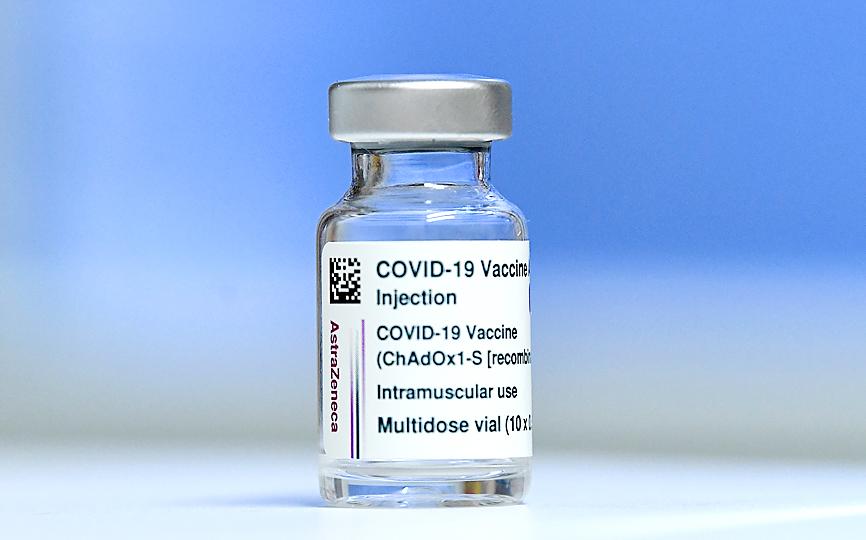The WHO on Monday gave emergency-use approval to AstraZeneca’s COVID-19 vaccine, meaning distribution can start to poorer countries starved of doses to fight the pandemic.
The AstraZeneca-Oxford jab forms the bulk of batches being lined up through COVAX, the global program aimed at procuring and shipping out vaccines equitably around the world, regardless of wealth.
It is only the second COVID-19 jab to have received WHO authorization, after the Pfizer-BioNTech vaccine.

Photo: Reuters
“The WHO today listed two versions of the AstraZeneca-Oxford COVID-19 vaccine for emergency use, giving the green light for these vaccines to be rolled out globally through COVAX,” the UN health agency said in a statement.
The two versions given the seal of approval are being produced by the Serum Institute of India, and by SK Biopharmaceuticals Co in South Korea.
Separate reviews were needed for each production process, although the vaccine is the same.
“Countries with no access to vaccines to date will finally be able to start vaccinating their health workers and populations at risk, contributing to the COVAX facility’s goal of equitable vaccine distribution, but we must keep up the pressure to meet the needs of priority populations everywhere and facilitate global access,” WHO Assistant Director-General Mariangela Simao said. “To do that, we need two things — a scale-up of manufacturing capacity and developers’ early submission of their vaccines for WHO review.”
The organization’s emergency-use listing procedure assesses the quality, safety and efficacy of COVID-19 vaccines, and is a prerequisite for vaccines in the WHO coled COVAX facility.
AstraZeneca vaccines from India and South Korea made up almost all of the initial 337.2 million doses lined up for COVAX’s first wave of distribution, which is set to begin later this month.
About 145 participating economies are set to receive enough doses to immunize 3.3 percent of their collective population by the middle of this year.
Both vaccines require two injected doses.
Meanwhile, South Africa has asked the Serum Institute of India to take back the 1 million COVID-19 vaccine doses the company had sent early this month, the Economic Times reported yesterday, a week after the country said that it would put on hold use of AstraZeneca’s shot in its vaccination program.
One million doses of the COVID-19 vaccine landed in South Africa last week and 500,000 were due to arrive in the next few weeks.
South Africa’s health minister had said that the government might sell doses of AstraZeneca’s vaccine, after the country paused its rollout following a small clinical trial that showed it offered minimal protection against mild to moderate illness from the 501Y.V2 coronavirus variant dominant in the country.
AstraZeneca has said its vaccine appears to offer only limited protection against mild disease caused by the South African variant, based on data from a study by South Africa’s University of the Witwatersrand and the UK’s University of Oxford.

A Chinese aircraft carrier group entered Japan’s economic waters over the weekend, before exiting to conduct drills involving fighter jets, the Japanese Ministry of Defense said yesterday. The Liaoning aircraft carrier, two missile destroyers and one fast combat supply ship sailed about 300km southwest of Japan’s easternmost island of Minamitori on Saturday, a ministry statement said. It was the first time a Chinese aircraft carrier had entered that part of Japan’s exclusive economic zone (EEZ), a ministry spokesman said. “We think the Chinese military is trying to improve its operational capability and ability to conduct operations in distant areas,” the spokesman said. China’s growing

Nine retired generals from Taiwan, Japan and the US have been invited to participate in a tabletop exercise hosted by the Taipei School of Economics and Political Science Foundation tomorrow and Wednesday that simulates a potential Chinese invasion of Taiwan in 2030, the foundation said yesterday. The five retired Taiwanese generals would include retired admiral Lee Hsi-min (李喜明), joined by retired US Navy admiral Michael Mullen and former chief of staff of the Japan Self-Defense Forces general Shigeru Iwasaki, it said. The simulation aims to offer strategic insights into regional security and peace in the Taiwan Strait, it added. Foundation chair Huang Huang-hsiung

PUBLIC WARNING: The two students had been tricked into going to Hong Kong for a ‘high-paying’ job, which sent them to a scam center in Cambodia Police warned the public not to trust job advertisements touting high pay abroad following the return of two college students over the weekend who had been trafficked and forced to work at a cyberscam center in Cambodia. The two victims, surnamed Lee (李), 18, and Lin (林), 19, were interviewed by police after landing in Taiwan on Saturday. Taichung’s Chingshui Police Precinct said in a statement yesterday that the two students are good friends, and Lin had suspended her studies after seeing the ad promising good pay to work in Hong Kong. Lee’s grandfather on Thursday reported to police that Lee had sent

A Chinese ship ran aground in stormy weather in shallow waters off a Philippines-controlled island in the disputed South China Sea, prompting Filipino forces to go on alert, Philippine military officials said yesterday. When Philippine forces assessed that the Chinese fishing vessel appeared to have run aground in the shallows east of Thitu Island (Jhongye Island, 中業島) on Saturday due to bad weather, Philippine military and coast guard personnel deployed to provide help, but later saw that the ship had been extricated, Philippine navy regional spokesperson Ellaine Rose Collado said. No other details were immediately available, including if there were injuries among